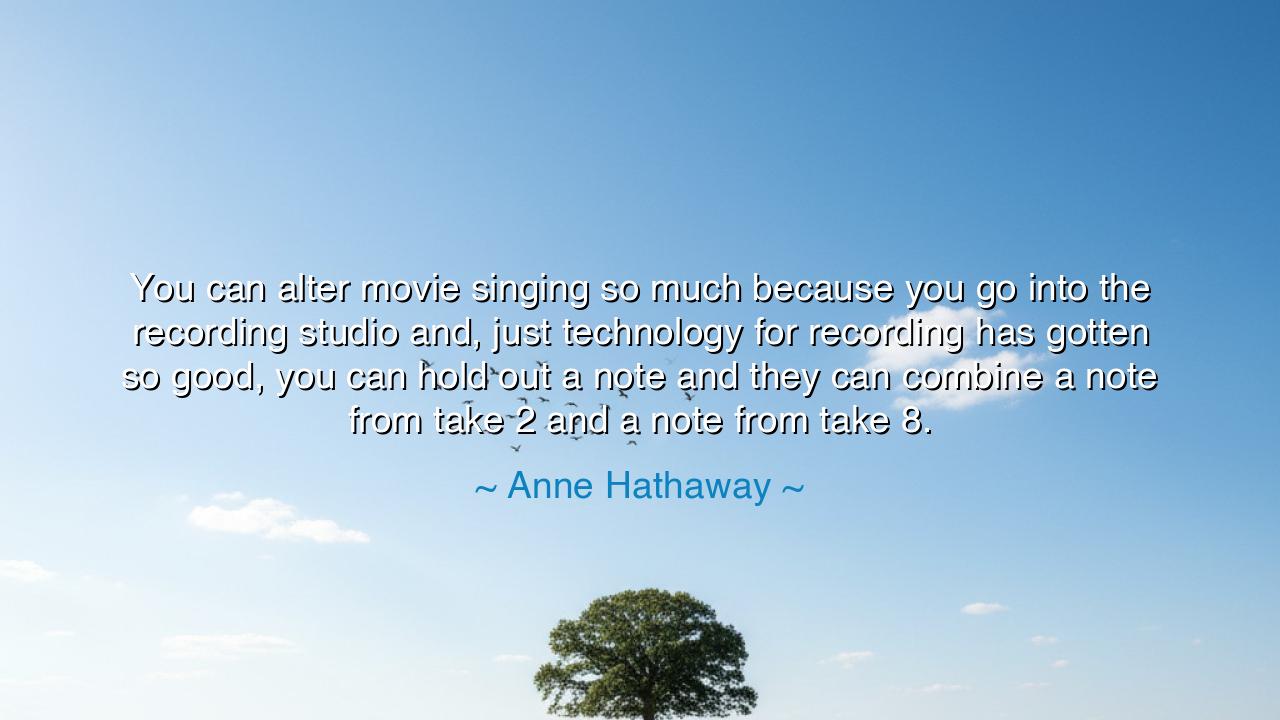
You can alter movie singing so much because you go into the
You can alter movie singing so much because you go into the recording studio and, just technology for recording has gotten so good, you can hold out a note and they can combine a note from take 2 and a note from take 8.






Hear the words of Anne Hathaway, spoken from her craft: “You can alter movie singing so much because you go into the recording studio and, just technology for recording has gotten so good, you can hold out a note and they can combine a note from take 2 and a note from take 8.” In this statement, she unveils the hidden truth of modern art: that what the ear hears is not always what the breath has sung, but a weaving of fragments, polished and bound by technology. It is a reminder that in this age, the line between the raw and the refined, between the natural and the constructed, grows thin.
From the earliest days of song, the human voice was naked and unaltered, rising in temples and markets, in courts and fields. The singer’s breath was their only instrument, their patience and practice their only polish. A wrong note lingered in memory, and a perfect phrase lived forever in the hearts of those who heard it. But now, as Hathaway reveals, the recording studio is itself an instrument, where moments from many attempts are stitched together, giving the illusion of flawless mastery. Technology, wondrous though it be, reshapes what was once fleeting into something immortal—and yet, perhaps, less real.
History too shows us this pattern. When artists first learned to paint, they used crude pigments and rough tools. Their works, though imperfect, carried the vitality of the human hand. But as brushes grew finer and techniques advanced, paintings became so polished that they nearly imitated reality. Some rejoiced at this perfection, while others, like the Impressionists, later rebelled, insisting that art must breathe, that it must reveal the hand of its maker. So too with music: the more technology refines it, the more we must ask whether the soul of the singer remains, or whether it is lost in the pursuit of perfection.
Consider the story of Caruso, the great opera tenor of the early 20th century, who sang before primitive recording horns. His recordings are raw, imperfect, marked by the limitations of the age. And yet, when we listen, we hear the spirit of a man in full command of his gift, every note born of his own lungs, untouched by the splice of machines. His legacy endures not because it was flawless, but because it was true. By contrast, the modern age tempts us with voices that can be endlessly corrected, yet in that correction, the flame of authenticity flickers.
Yet Hathaway does not condemn, but simply reveals. She acknowledges that in cinema, where story and image must unite, the tool of technology allows actors to sing beyond their natural limits, to serve the tale more fully. This is no evil in itself. For tools are not enemies; they are servants. But her words whisper a warning: let us not forget that what is crafted is not always the same as what is lived, and that the pursuit of polished sound must not blind us to the beauty of the human voice in its raw, unvarnished state.
The lesson, then, is double-edged: embrace technology, for it can elevate and refine; but also honor authenticity, for only what is real carries the true weight of the soul. Do not despise imperfection, for it reveals humanity. And do not worship artificial perfection, for it may dazzle but leave the heart unmoved. The wise learn to balance both—the gift of tools with the integrity of truth.
Practical counsel stands before you: If you create, use the instruments of your age, but let them serve your spirit, not replace it. If you listen, cherish not only the polished performances, but also the live and imperfect ones, where the human heart is most clearly heard. And in life itself, remember: it is not the seamless blending of many takes that gives you worth, but the courage to sing your one true song, flawed though it may be, yet undeniably your own.
So let Hathaway’s words be a torch: technology may splice together many voices, but only authenticity can touch eternity. May you, whether singer or listener, creator or seeker, remember that perfection is hollow if it has no soul, but imperfection filled with truth will resound through the ages like the echo of a bell that was struck once, and never forgotten.






AAdministratorAdministrator
Welcome, honored guests. Please leave a comment, we will respond soon